This piece is part of my From the Window Seat series, where I take you along and give you a first-person perspective into my travels. In this series, I share my daily rhythms, once-in-a-lifetime experiences, and reflections on travel from a journal-style vantage point, giving you a window into wherever I am in the world. Thanks for coming along for the ride, and let me know what view you want to see From the Window Seat next time!
If you want to learn more about moving to Abidjan, Côte d’Ivoire (Ivory Coast), check out my full post here.
AFCON 2024 context note
In January and February of 2024, Côte d’Ivoire (Ivory Coast) hosted the African Cup of Nations, or AFCON. AFCON is the biggest international African football (soccer for my American brain) tournament, bringing together 24 of the best African national teams every 2 years. When I first started researching Côte d’Ivoire in preparation for my move, AFCON was one of the first things that popped up. I was excited at the prospect of the month-long energy that the games would bring, but I never imagined I’d be watching Côte d’Ivoire win it all on their home turf.
After winning their first game in the tournament, The Elephants, Côte d’Ivoire’s team, had a rather disastrous time in the Group Stage, culminating in a humiliating 4-0 loss to Equatorial Guinea that threatened to keep them out of the Round of 16. They made it out of the Group Stage by sheer luck as the 16th-ranked team.
As if going into the Round of 16 as the 16th team wasn’t dramatic enough, the team fired its head coach after the national embarrassment of the Equatorial Guinea game. Thus, The Elephants entered the Round of 16 as a beleaguered team that many had written off, with a new coach to boot.
To the absolute shock of the nation (and the continent more broadly), 3 wins later, the Elephants of Côte d’Ivoire were teed up to face the Super Eagles of Nigeria in the AFCON final match.
The energy that built over the weeks that led to the finals was electric beyond all measure. After the near-death of their team, Ivorians suddenly had a reason to get excited for their underdog team. All of the taxes, construction, and preparation burdens that the citizens had born in the years leading up to hosting AFCON started to feel worth it.
Build up to the final: securing tickets
As soon as the tickets launched on the AFCON website last month, my friends and I obsessively stalked the site, looking for any openings in the hours-long online queue to access the tickets. Three days after they launched, we got our lucky break. A friend noticed a ticket drop before the rest of the city, and after only a few minutes in the queue, I was grabbing my allotted 4 tickets. I opted for the cheapest tier and paid 5,000 cfa (~$8) per ticket – an absurdly cheap price when I thought about how much Super Bowl tickets were going for during the same weekend as the AFCON final.
When I bought my tickets, I had no idea who would make it to the finals, or even if I would feel safe enough to go. Major sporting events are high on the chaos meter, and Côte d’Ivoire’s stadiums have an unfortunate history of deadly stampede/crushing events. All I knew was that I happened to be in the country during their AFCON host slot, and I would be a fool not to soak it all in to the best of my ability.
Fast forward to today, and Côte d’Ivoire’s place in the final match still doesn’t seem real. Every game that they won after the Group Stage was met with raucous, incredulous celebration which spilled into the streets for days after each match, reaching a frenzied pitch today. Over the last two days, I’ve carefully distributed my extra 3 tickets to friends at face value, a gift met with reverence. As soon as Côte d’Ivoire qualified for the final, resale prices skyrocketed as everyone scrambled for tickets, with WhatsApp group bids reaching over $100 for $8 tickets.
But now it’s game day, and my 4 tickets are in the hands of friends, as are the 4 tickets of Hannah, a friend who bought the 4-ticket block in the row below mine. Still, I check the tickets on my phone more times than I should, not quite believing I’m actually going.
Getting to the match: planning transportation
Today, me, my housemate, Hannah, and her friends who are in town for AFCON will join forces to make our way to the stadium and navigate the chaos of an all-day AFCON adventure. Everything in Abidjan operates on word-of-mouth information, so that’s how we’ve gone about planning our journey to the stadium.
Here’s the information we’ve gathered so far:
- The final will be held at Alassane Ouattara Olympic Stadium in Ebimpé, about an hour outside of central Abidjan on a good day. With traffic, all bets are off.
- A friend of a friend went to the semifinal match in Ebimpé which started at 8 pm, left Abidjan at 4 pm, and made it to the match at halftime due to outlandish traffic.
- The final starts at 8 pm, but there’s a closing ceremony which starts around 6:30.
- The city is running a free public bus service from various points around the city to the stadium on game days. All we have is a short announcement video posted at the beginning of AFCON listing the pickup points, with no other information on schedules, timing, or logistics.
Based on what we know, we assume that if we try to take taxis to the stadium, we’ll not only pay an arm and a leg, but there are also no guarantees of speed. We’ve decided to chance the AFCON public bus service – if nothing else, we’ll get an adventure out of it.
This game is a once-in-a-lifetime opportunity, and we’re not about to arrive halfway through the game. So, our group has agreed to meet at a pickup point in the Marcory neighborhood at noon. We’ve chosen Marcory as it is a good middle-ground meeting point between our various apartments and is also one of the more foreigner-friendly neighborhoods.
Sunday, February 11th, Abidjan, Côte d’Ivoire: Match Day
10 am: Pre-Adventure Prep
I woke up earlier than usual today, with an energy a little bit reminiscent of kid-on-Christmas-morning coursing through me. The day that we’ve been building to for the last month is finally here: the AFCON final.
I throw on my lightest long flowy pants and my bright orange Elephants jersey. A friend and I asked our favorite taxi driver to buy us jerseys at the beginning of AFCON, assuming we might only be able to wear them for a game or two before the Elephants got kicked out. However, they’ve turned out to be a surprisingly good investment. Beyond the games themselves, these bright orange jerseys have become the de facto daily wear of the residents of Abidjan over the last month, and particularly on a match day or the day after, you can expect at least half of the folks you encounter to be wearing some sort of Elephants gear.
Before I pack a day bag and make my way to Marcory to meet the rest of the group, I give in to convenience and order breakfast on Glovo, a fantastic food delivery app. I order delivery more in Abidjan than I ever did in the US, mostly because for only $3/month, I get unlimited free delivery. This morning, I order a plain omelet with baguette chunks, a classic Ivorian breakfast option. I also order a Nutella croissant for a sweet snack later in the day. I have no idea what food options will look like for the rest of the day, so I’m trying to start strong breakfast-wise.
After breakfast, I throw on my shoes and take a quick walk to the Superette around the corner. I grab a couple of small Celeste-branded water bottles for the road – they’re an official sponsor of AFCON, and at the last game I went to, they made me throw away any bottles that weren’t Celeste-branded. The risk of getting my reusable bottle confiscated at the stadium is too high, so disposable bottles it is. I grab a few oranges and other small snacks from the Superette, and head back to my apartment, where I finish putting together my day bag.
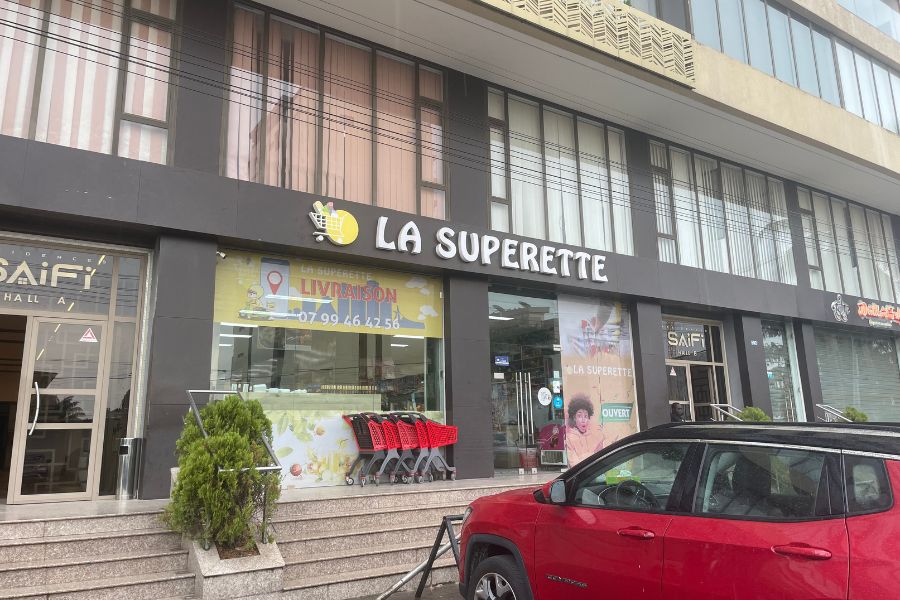
My bag looks like I’m preparing for a tropical apocalypse journey of an undetermined length. Among other things, I have a portable phone charger, a lightweight long-sleeved button-down, bug spray, sunscreen, tissues to use as sweat moppers and toilet paper, sunglasses, hair ties, earplugs, water, and snacks. I’m leaving my wallet at home lest things get stolen, so I’ve stuffed a few bills into my shoes for safekeeping.
At long last, it’s time to make my way to Marcory. Once my housemate is ready, I open the Yango app on my phone and call a taxi to the Marcory Youth Center for 1500 CFA (~$3). It’s 11:30 a.m., and we have no idea when we’ll make it back home tonight.
12:00 pm: Catching the Bus to the Ebimpé stadium
Our group times our arrival in Marcory perfectly, and our taxi arrived about 2 minutes after the taxi with Hannah’s group. It’s 90 degrees and 75% humidity, so I’m already sweating. However, I stopped drinking water about an hour ago – none of us have any idea how long the busses to Ebimpé will take, and we’ve all gotten very good at strategic dehydration. It’s a fine line of potential misery that we walk, between dehydration and UTIs versus debilitating discomfort with no bathrooms in sight. At this point, it’s second nature.
As soon as we meet up, we notice SOTRA busses, the main Abidjan bus company, lining the street, which we take as a very good sign. However, with no signage or apparent organization of the buses, we need to do a bit of information gathering. We talk to a woman at a roadside maquis (a small informal restaurant), who tells us that the busses won’t start running until 3 pm. Worried, we cross the street in search of additional information.
Across the street, we find a bus that is beginning to load – a fantastic sign. We find someone who appears to be a driver, and he confirms that the bus will be leaving in 10 minutes or so, once it is full. “Once it is full” is the way that most public transportation runs here (rather than prescribed schedules) so we breathe a sigh of relief knowing that we won’t have to wait around for 3 hours for busses to start departing.
Instead of loading ourselves onto the sweltering bus immediately, we stop to chat with a woman and her son selling some last-minute jerseys on the side of the road. Hannah’s guests from out of town don’t have jerseys yet, so we strike a deal with the vendor, and pretty soon they’re suited up in traffic-cone orange, ready to start blending in with the crowd just a bit more.
After a last-minute bathroom run, we make it onto the bus just as seats are running out. The AFCON hospitality is buzzing on the bus. We are some of the only foreigners on the bus, and the locals insist that we take seats, regardless of our attempts to refuse. A policeman boards and asks everyone their nationalities but only checks some people’s IDs, a clear example of foreigner privilege, particularly during AFCON.
12:30 pm: Bus ride to Ebimpé
Before long, we’re rolling, and the bus isn’t nearly as packed as I had feared. While there are a good number of people standing, we’re not packed body-to-body like sardines – a pleasant surprise. As soon as we pull out of Marcory, the energy on the bus starts to build. Before long, everyone is sharing snacks, with one kind man distributing plantain chips to the whole bus. Chants and songs break out, reaching ear-splitting volumes, particularly when we pass any other taxis or transport that are decked out with Ivorian flags for the day.
Every time we see another bus, our bus driver starts honking, we start chanting, and the other bus returns the joyful cacophony. I steal a glance over to Hannah and her mutual expression confirms what I’m feeling. We were a bit worried about being the “let’s try public transit” ringleaders with guests, but so far, we can’t imagine a better way to make our way to the stadium.
We’ve now made it out of Marcory and are cruising through Cocody, but we seem to be going in the opposite direction of the stadium. I check our position on the map a few times but no one on the bus seems to be worried, so I sit back and enjoy the ride. Soon, the reason for our detour becomes clear: the city has blocked off an entire network of backroads highways exclusively for busses and VIP vehicles going to the stadium. Suddenly, the fears of hours-long traffic jams evaporate, and the bus erupts into cheers as police open up a roadblock for us and we gun it onto an empty highway.
As we speed closer to the stadium, it soon becomes clear that our noon departure was wholly unnecessary. However, as with most things in Abidjan, it’s nearly impossible to predict how things will turn out time-wise. We all agree that it’s better to play it safe than miss the game. After about an hour, we pull into a bus line about a half mile from the stadium and file out of the bus.
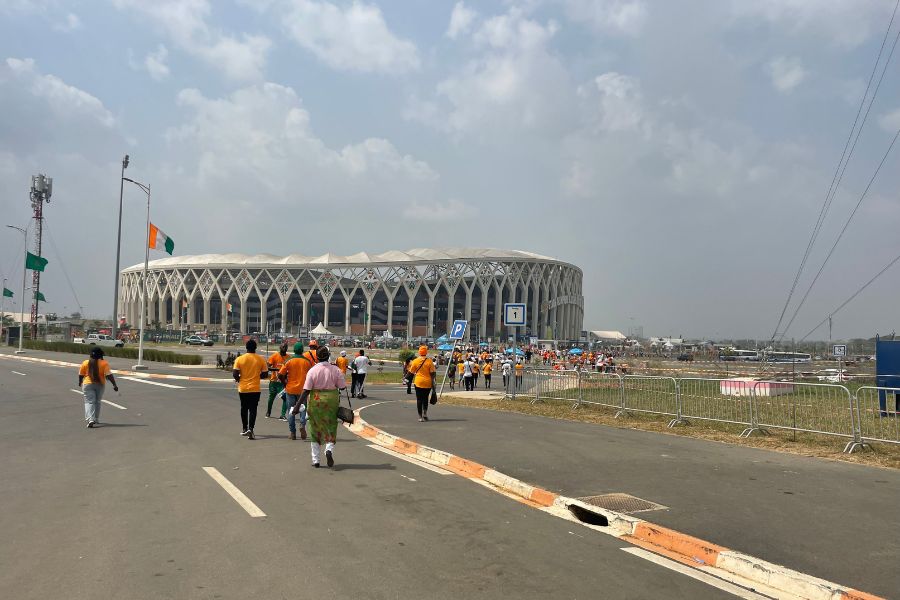
2:00 pm: An Afternoon at the Stadium
Even though we’re early, we’re far from alone. Hundreds of other match-goers, almost all Ivorians clad in orange jerseys, form a human river snaking towards the stadium. As we walk, a few members of our group grab beers, and one who didn’t buy a jersey earlier buys a last-minute orange scarf to make sure he has something to show where his loyalties lie.
We stop at a security checkpoint as we near the stadium, and despite signs forbidding food, drinks, and plenty of other items, none of our belongings are taken. I highly suspect this is our white foreigner privilege at it again, and before we know it, we’ve made it to the outskirts of the stadium without incident.
We’re now among the thousands of spectators already thronging the stadium, ready for an all-day party. We know that once we scan our tickets into the stadium interior it will be unwise to leave, so half of our group elects to head out into surrounding towns in search of a few more beers to pass the afternoon. I’m already melting in the sun, so I lead the other half of the group into the stadium. There have been many reports of double-issued tickets and people being turned away at the gates when tickets don’t scan, so I hold my breath as I put my phone to the scanner. Thankfully, the scanner lights up green, and I’m in.
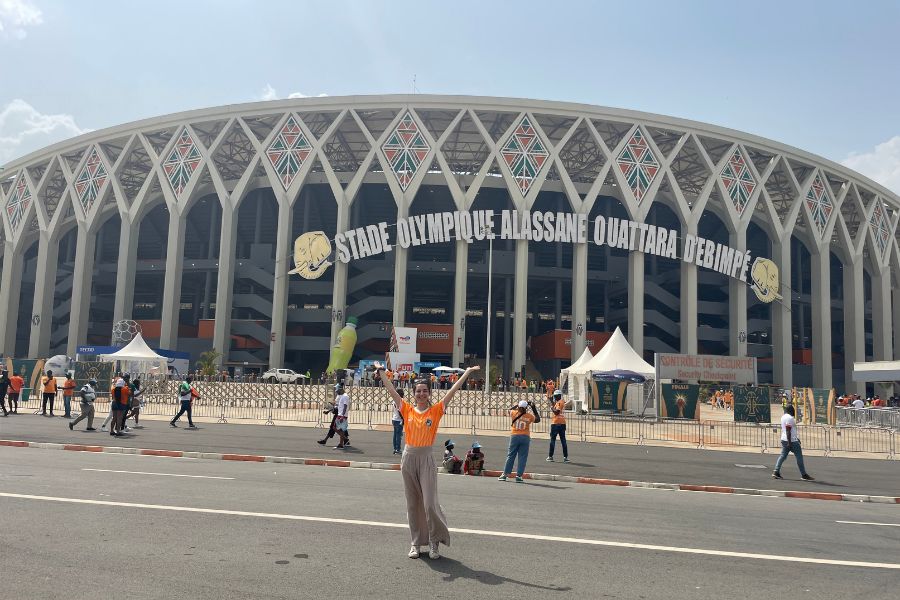
With a few hours to fill before the opening ceremony starts, I finally rehydrate and take the chance to relax in the shade. From high up on a staircase, I have a great view of the throngs below.
A man performs stunt tricks with a soccer ball, bouncing it on every part of his body while maintaining perfect control. Another guy walks around in a sweltering-looking silicone elephant head which completely covers his head and shoulders. Before long, there’s a short line of people waiting to take their pictures with him. A group of men pass by in full suits which would be more at home in a corporate boardroom than a stadium, if only they weren’t safety-vest orange.
6:30 pm: Opening Ceremony
By the time the Opening Ceremony rolls around, I’m more than ready to have something concrete to focus on. I’m now on hour 7 of near-constant sweat, and my waiting patience is starting to wane. Luckily, I can now sit back and let the show unfold.
The opening ceremony builds, starting with a local children’s orchestra passionately performing Akwaba, the theme song of this year’s AFCON. This catchy Afropop number by a celebrated Ivoirian band has become a persistent earworm this month in the best way – give it a listen to immerse yourself in the AFCON vibes!
After the children’s orchestra, they ratchet it up, cutting the lights and bringing in local artists to build the energy, interspersing their acts with fireworks which turn the stadium hazy with their residual smoke. Finally, as we inch closer to 8 p.m., the artists leave the field and the final flag ceremony begins. Everyone in the stadium has grappled for these tickets and has committed the better part of their day to making it here and witnessing this event. With the full attention of 60,000 spectators, the match begins.
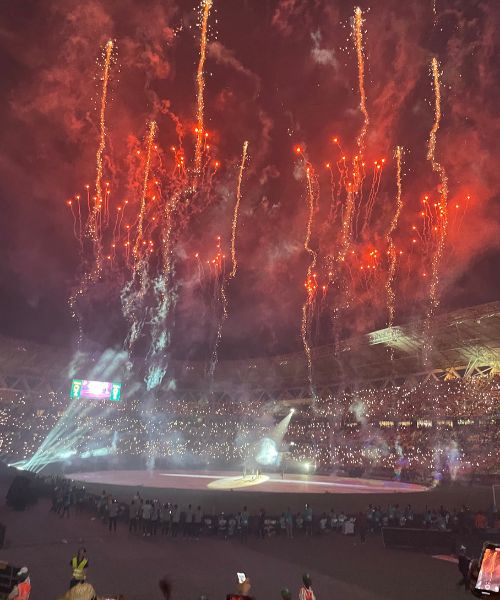
8 pm: Game Time: The 2024 AFCON Final
The first half of the match is a waiting game punctuated by disappointment for the stadium as Nigeria scores in the closing minutes, leaving us one goal down at halftime. While the excitement of the event is still there as we await the second half, it is tempered somewhat by the palpable anxiety. The Elephants are playing well so far, but the disastrous game with Equatorial Guinea still looms close in everyone’s memory, and no one can bear a similar result tonight.
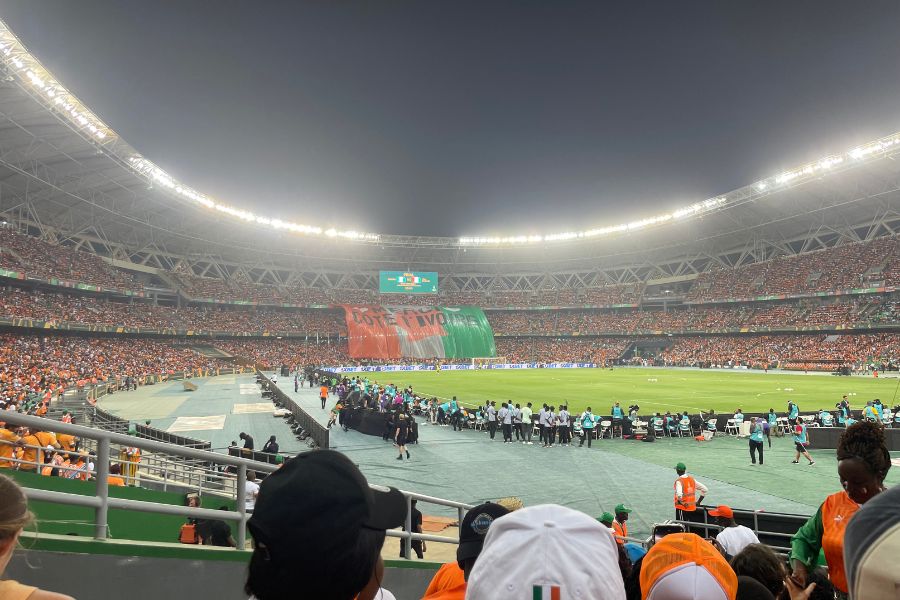
As the whistle blows for the second half, energy is tightly bottled. When the Elephants, still playing well, manage a goal in the 62nd minute, the celebration that Ivoirians have been waiting all night to begin is unleashed. Instead of tension mingled with disappointment, the tension is now infused with excitement as the tied game presses forward with the Elephants still controlling the field.
By the time Côte d’Ivoire’s sweetheart, Sebastian Haller, fires one in during the 81st minute, every person in the stadium is on their feet. As the Elephants take the lead, the celebrations in the stands are like nothing I’ve ever seen. People are on chairs, on shoulders, embracing strangers, shouting their revelry into the night. It is Sunday, and several of the locals that I’ve talked to today told me that they went to church for the first time in a while just to make sure they could pray for victory. With Haller’s goal, the sentiment in the stadium is clear: God is on their side, and victory for the Elephants is fated.
Despite the religious conviction that the 2nd goal brings, the final minutes of the game are torture for most of the attendees. Everyone is on their feet, and one woman in the row below me sits down and turns around in her seat, refusing to look at the pitch as the clock ticks closer and closer to the end. When the final whistle blows, any shred of self-control or humility remaining in the crowd is shattered, and the joy that erupts is long-awaited, exuberant, and pure.
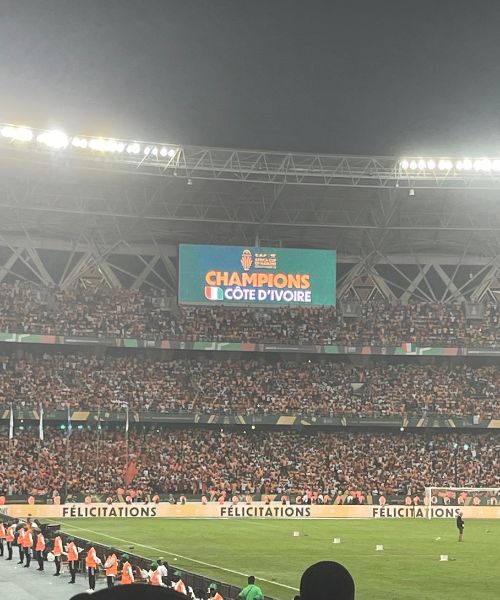
AFCON is, after all, the Cup of Nations, so the win isn’t complete until the giant golden cup is presented to the rightful winners. An appearance by the president and more fireworks accompany the ceremony on the field as the revelry in the stands is just getting started. It’s hard to imagine what this ceremony would feel like if Nigeria had managed a win – Ivoirians outnumber Nigerians in the stands at a magnitude that feels silly to put into numbers, and a stadium full of heartbroken people would constitute a completely different experience. Luckily, this evening I am getting the absolute best of Côte d’Ivoire as the country coalesces around their favorite sport.
11 pm: Making my way out of the stadium
As the fireworks illuminate the stadium, my group begins our exit attempt from the stadium. We’ll be taking the public busses home, and we know that the chaos of the return trip will make the trip earlier in the day look like child’s play. We’re out of the stadium and crossing a bridge towards the waiting busses when suddenly everyone is coughing and it’s hard to breathe. Our shirts go over our faces and we cross the bridge as quickly as we can, but the unexpected tear gas sends a jolt of seriousness through the otherwise revelatory mood.
Once we make it to the busses, I’m relieved to see that each bus is displaying its destination neighborhood. My group makes a split-second decision to break apart so that we can each get to our closest respective neighborhoods, knowing that there’s no guarantee how chaotic or expensive taxis will be tonight if we end up across the city from where we live.
I jump into a Marcory-bound bus alone, and it’s easy to second-guess this choice. I solo travel frequently and don’t mind navigating the world on my own. However, in the 5 months I’ve lived in Côte d’Ivoire, it’s shown itself to be a different beast, and the night of a massive football win isn’t exactly a normal day. Luckily, the crowd on the bus seems calm enough, and I wiggle my way into a corner to where I can hold onto a railing to try to keep myself out of the crush.
Our bus is packed, and once we’re on, there’s no information whatsoever as to the departure plan of the vehicle. Around us, other busses drive past us while we stand still, sweating enough into the sticky night that there are literal puddles on the floor below most people. I can feel my patience starting to shut down as the heat and exhaustion fight my solo female traveler instinct to stay vigilant and alert-looking. Finally, after nearly an hour of fits and starts, our bus inches its way onto the road.
12:30 pm: The bus ride home
The ride back is sweltering but more doable with the breeze from the cracked windows. As we pass along the closed-down road, children and adults from local villages who couldn’t make it to the stadium line the embankments, sharing their celebratory energy into the night.
Within the bus, the sentiments of the overheated crowd towards the driver are not exactly high after the hour-long wait. Every time he makes a turn that the group doesn’t agree with, the grumbles threaten to turn, but luckily we don’t have too many drunk folks on the bus. When we finally roll into the Marcory neighborhood of Abidjan where I caught my bus to the stadium over 12 hours ago, I can’t get out fast enough.
I open the Yango app on my phone to start the process of getting a taxi home. Unsurprisingly, surge pricing is in full effect, and a ride that would normally cost me around 1500 cfa ($2.50) is priced at nearly 6000 cfa ($10). It’s almost 2 am and I’m in no mood to hunt down a cheaper ride, so I grab the first car I can get, and before I know it, I’m finally back at my apartment in the Zone 4 neighborhood.
As I peel off my sweat-soaked jersey, my eye lands on the two stars embroidered above the Elephants logo. A team earns a star when it wins an AFCON, and I can’t wait to go find someone who can embroider a third star on the Jersey. I can’t imagine a better souvenir to capture the adventures and joy that the month of AFCON has brought, and I can only feel immense gratitude for the opportunity to be in the right place at the right time as the Elephants played their way to glory.

Love the blog and especially the last post
Keep’s coming
What a long wonderful day/night of a life time. I can see how an event like this will stick with you forever. The bus going sounded like the perfect choice. A brave choice that immersed you in the raw spirit of the love of soccer and people at their best.
Cheers